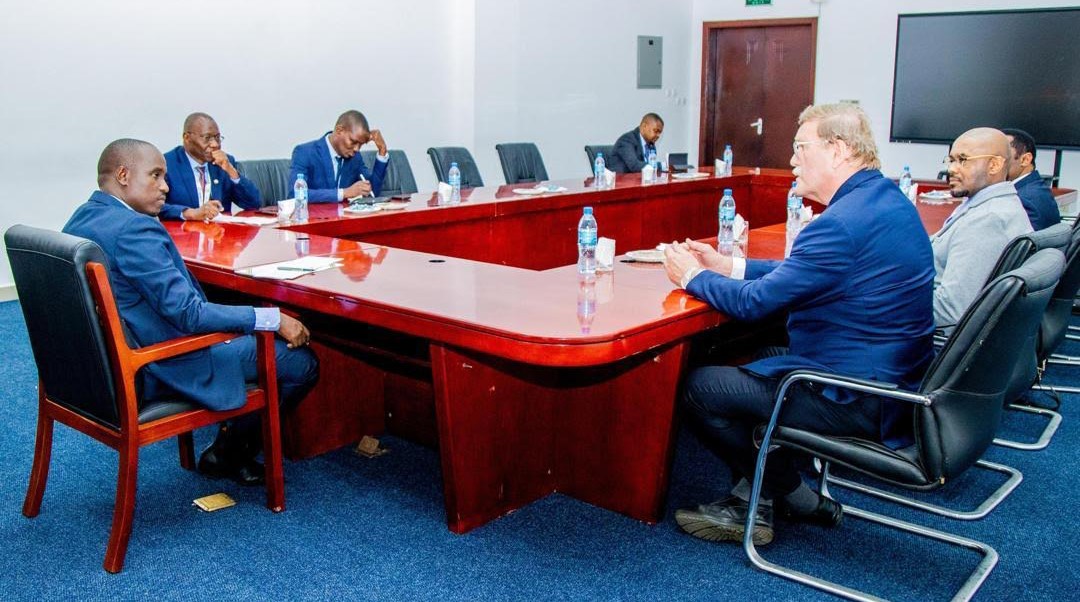Magufuli: We erred in 1990s sell-offs

President John Magufuli is briefed by Mwanza Urban Water Supply and Sanitation Authority (Mwauwasa) managing director Anthony Sanga on the water project launched by Dr Magufuli in Sengerema District, Mwanza Region, yesterday. PHOTO | STATE HOUSE
What you need to know:
- Launching the Sengerema Town Water Supply and Sustainable System (STWSSS) in Nyamazugo Village in Sengerema District, Mwanza Region yesterday, President Magufuli said he was not putting blame on his predecessors for mistakes but that he had the right to speak about the errors and take action to correct them.
Dar es Salaam. President John Magufuli yesterday admitted that the country made mistakes during the privatisation process resulting in at least 197 firms to remain dormant.
Launching the Sengerema Town Water Supply and Sustainable System (STWSSS) in Nyamazugo Village in Sengerema District, Mwanza Region yesterday, President Magufuli said he was not putting blame on his predecessors for mistakes but that he had the right to speak about the errors and take action to correct them.
Dr Magufuli emphasised that it was crucial for strategic institutions to be owned by the public.
He said the 197 privatised firms have never been operational ever since they were privatised over a decade ago.
At least 274 industries were privatised by 2012 as part of the structural reforms that were aimed at removing the government from engaging in business.
This was a huge shift from the tightly state control of the economy by the state in the erra that spanned from 1960s to early 1990s.
“We privatised even strategic institutions like the railways corporation. It’s like we decided to leave each and everything to investors, which was wrong,” he emphasised.
The Tanzania Railways Corporation, whose management was handed to an Indian firm, did not deliver, according to President Magufuli.
The Head of State said Tanzania made some progress in creating an industrial base after independence but this was sabotaged by the privatisation process.
Dr Magufuli insisted that the new industrialisation drive that entails facilitating the establishment of new factories is part of the efforts to correct the wrong done during privatisation.
Statistics show that so far a total of 371 industries, including 89 large factories, have been built in Coast Region alone.
“But we have 197 dormant factories which never operated since they were privatised. In Morogoro one such factory has been turned into a cowshed. Will I be wrong to allow the State regain ownership of these factories?” questioned President Magufuli.
He explained that there were so many things that had been done wrongly, so many dubious contracts entered by the government in the past that the country was losing billions of shillings monthly.
“I could mention some of the rot but some of these things are in court so I do not want to go into details,” President Magufuli noted.
He argued that this was the reason he did not travel abroad frequently so that he would have time to rectify some of the matters.
Dr Magufuli reiterated that it was crucial to put in place a conducive environment to allow development to grow.
“I’ve turned down a total of 60 invitations to visit foreign countries and attend meetings including the AU summit currently taking place in Addis Ababa Ethiopia,” he said.
He is being represented by Vice President Samia Suluhu Hassan.
Last month, the deputy minister in the Prime Minister’s Office (Labour, Employment and Youth), Mr Anthony Mavunde, told Parliament that there were plans to invite investors to bid for dormant factories in order to revive them.
Mr Mavunde said a technical committee comprised of officials from the Ministry of Industry, Trade and Investments, the Tanzania Industrial Research and Development Organisation, and the Treasury was compiling findings from a review of the status of the dormant factories before issuing conditions for the planned revival.
Meanwhile, as he launched the STWSSS yesterday President Magufuli asked people living around Lake Victoria to conserve the environment and stop deforestation in order to ensure the project remained sustainable.
He also asked them to stop illegal fishing. He explained that Thiodon element, which is used in illegal fishing, had serious health effects if it entered the water system.
“Thiodon has serious health implications to life including causing cancers, miscarriages, impotency and reducing ability to work,” he said ordering regional and district officials to seriously address the challenge.
For his part, African Development Bank (AfDB) representative Godfrey Kaijage expressed optimism that the STWSSS project would transform people’s lives by the reducing the time they spend on fetching water.
The Water and Irrigation minister Gerson Lwenge, for his part, assured President Magufuli that the target of providing 95 per cent of the urban population and 85 per cent of rural population with clean and safe water by 2020 would be realised.




